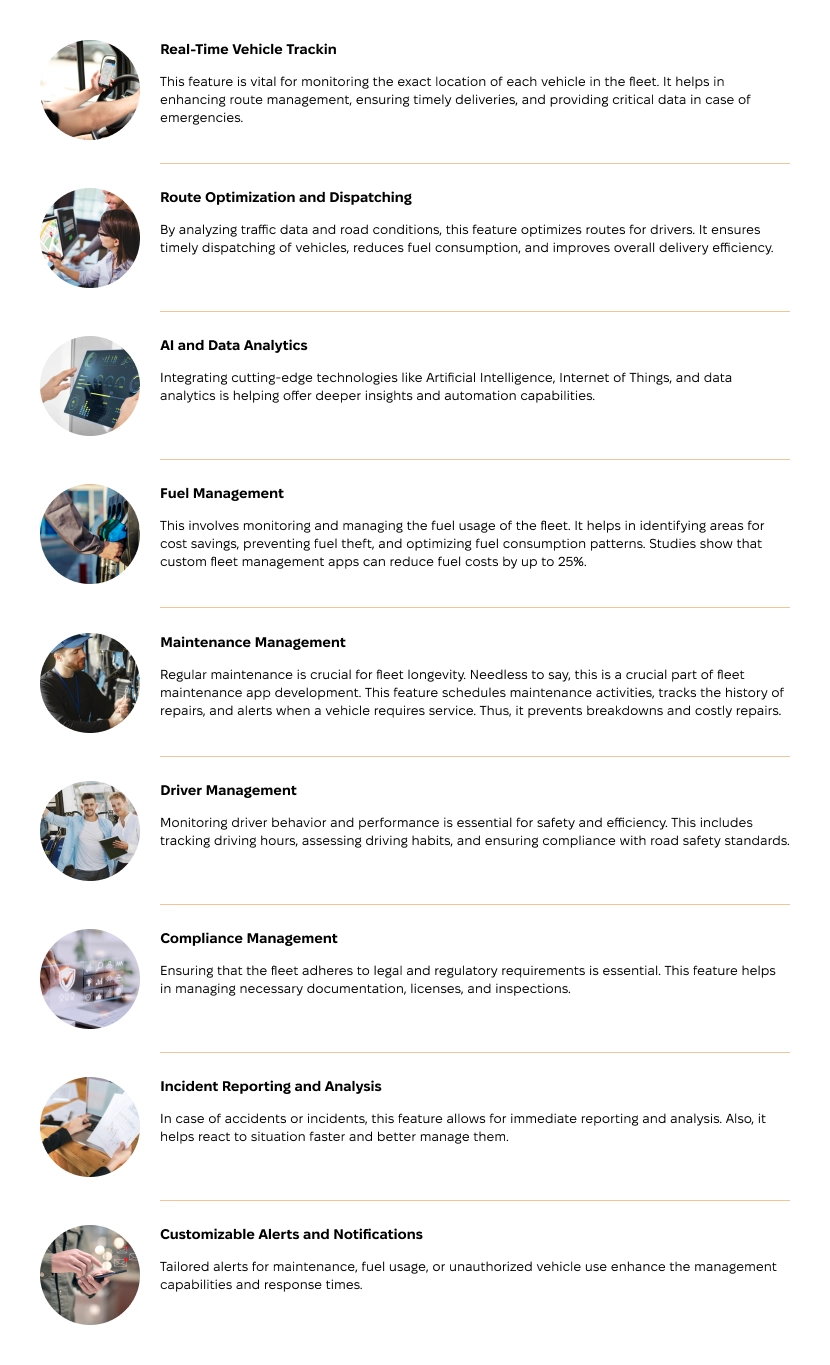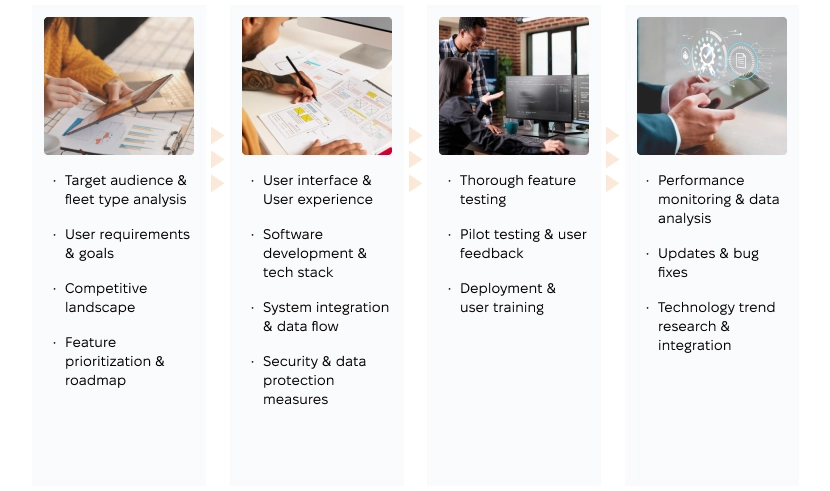How do you create a fleet management system?
Begin with planning and analysis, understand user needs, design UI/UX, select the appropriate tech stack, develop, test, and deploy the system, ensuring ongoing maintenance and updates.
Published: 15 February, 2024 · 10 mins read
Fleet management has taken off in the automotive industry, especially as we move towards shared mobility and self-driving vehicles. Modern fleet management apps have a lot to offer, including real-time tracking, route optimization, incident reporting, and customized alerting. They reduce operational expenses, improve decision-making, optimize fuel consumption, and enable dynamic route planning. In our blog post, we explore the key aspects of fleet management apps, from the development process and costs to in-demand features.
The market of fleet management solutions is evolving fast. That’s why the concept of fleet
management app development is as relevant as ever. Having a set of custom tools brings
businesses benefits like reducing operational costs, enhancing driver safety, and
streamlining maintenance. It enables more accurate tracking, efficient route planning, and
data-driven decision-making, leading to significant improvements in operational
effectiveness. For example, features inspired by a
road trip planning app
can enhance route optimization and provide a better user experience for fleet drivers.
In this article, we’ll dive into effective strategies and main considerations for creating
successful fleet management apps. This is based on the extensive experience the Exoft team
has in developing custom solutions.
This article will include:
Read on to learn how to get your fleet management project going efficiently.
According to Deloitte , the top five players make up 90% of the fleet management market in North America. That’s why companies need new, innovative solutions to stay ahead. A robust fleet management application development process must incorporate features that address the comprehensive needs of modern fleet operations. Here are some of the most common ones.

This feature is vital for monitoring the exact location of each vehicle in the fleet. It helps in enhancing route management, ensuring timely deliveries, and providing critical data in case of emergencies.
By analyzing traffic data and road conditions, this feature optimizes routes for drivers. It ensures timely dispatching of vehicles, reduces fuel consumption, and improves overall delivery efficiency.
Integrating cutting-edge technologies like Artificial Intelligence, Internet of Things, and data analytics is helping offer deeper insights and automation capabilities.
This involves monitoring and managing the fuel usage of the fleet. It helps in identifying areas for cost savings, preventing fuel theft, and optimizing fuel consumption patterns. Studies show that custom fleet management apps can reduce fuel costs by up to 25%.
Regular maintenance is crucial for fleet longevity. Needless to say, this is a crucial part of fleet maintenance app development. This feature schedules maintenance activities, tracks the history of repairs, and alerts when a vehicle requires service. Thus, it prevents breakdowns and costly repairs.
Monitoring driver behavior and performance is essential for safety and efficiency. This includes tracking driving hours, assessing driving habits, and ensuring compliance with road safety standards.
Ensuring that the fleet adheres to legal and regulatory requirements is essential. This feature helps in managing necessary documentation, licenses, and inspections.
In case of accidents or incidents, this feature allows for immediate reporting and analysis. Also, it helps react to situation faster and better manage them.
Tailored alerts for maintenance, fuel usage, or unauthorized vehicle use enhance the
management capabilities and response times.
Each of these features plays a pivotal role in the success of fleet management software development.
Together, they ensure a comprehensive and effective management solution.
Developing fleet management software is a multi-faceted process. Each phase is critical to ensuring the final product meets the needs of its users and operates effectively.

When estimating the cost of a custom fleet management app, it's essential to consider
various stages of the development process, each with its own cost implications.
For a real-life breakdown on a similar project, read this in-depth article on
trucking app development.
These may vary depending on the complexity of the project and the fleet management app features.
However, developing an enterprise-level solution usually involves the following steps:
| Development Stage | What It’s About | Estimated Cost |
|---|---|---|
| Market Research | Researching the market and competitors. Essential for understanding market needs and validating the app idea. | $2,000 - $10,000 |
| Requirement Design & Planning | Involves defining product requirements and project planning. The cost depends on the complexity of the app's features and functionalities. | $3,000 - $15,000 |
| UX & UI Design | Creating user flows, wireframes, and designing interfaces. This stage can be quite resource-intensive. | $10,000 - $50,000 |
| Frontend & Backend Development. | The core development phase, involving server, database, and application logic implementation. The design turns into graphical elements that enable user interaction with the app. | $35,000 - $250,000 |
| Quality Assurance | Ensuring the app functions as intended and meets quality standards. Here, the QA team identifies and fixes all possible bugs. | $5,000 - $35,000 |
| Fleet Management Application Release | Includes app store optimization and publishing the app on various platforms such as AppStore and Play Store. | $5,000 - $25,000 |
| Post-Launch Support & Maintenance | Ongoing support to monitor app performance and address user feedback. Updates are planned and implemented to improve the functionality and security. | $10,000 - $30,000 |
| Marketing & User Acquisition | Promoting the application; increasing user acquisition; engaging with the target audience through various channels. | $10,000 - $25,000 |
Providing a detailed cost breakdown ensures transparency and helps in budget planning for
those looking to build a fleet management app.
But a lot depends on your needs and desired customization levels. Custom mobile apps are made
from scratch and require more time and resources, thus increasing the cost. But we offer a
whole range of options to satisfy every need, including fleet management app development for
startups.
Want to estimate how much your own custom app would cost?
Drop us a line.
The benefits of fleet management system are clear, significantly impacting business operations in multiple ways:
These advantages demonstrate why fleet management software is an indispensable tool for businesses looking to optimize their fleet operations.
In this article, we have explored the multifaceted world of fleet management mobile app
development.
From enhancing operational efficiency to improving safety and compliance, creating your own
app offers substantial advantages for businesses of all sizes. This applies to companies in
need of serious car fleet management and companies in transport and logistics.
Companies looking to develop a fleet management system will find significant value in a custom
fleet management app. Exoft is well-equipped to provide expert consultation and development
services for those interested in exploring these solutions further.
From understanding the essential fleet management app features to diving into the detailed
development process, we've covered the critical components that make these apps effective and
efficient. We've also discussed the various cost factors involved in building such apps so
that you get a clear picture of the investment required.
As this technology continues to evolve, the significance of adopting a custom and well-designed
fleet management solution becomes increasingly apparent. For businesses looking to optimize
their fleet operations, we hope the insights provided in this article serve as a valuable resource.
Just starting your custom fleet? The key thing is to work with a team that has experience in
logistics management software. Partnering with a seasoned software development company like Exoft can make the journey
of creating a robust fleet management system smoother and more successful.
If you want to supercharge your business with a cost-effective app that will transform the
way you operate,
contact us
and we’ll take care of the rest.
Begin with planning and analysis, understand user needs, design UI/UX, select the appropriate tech stack, develop, test, and deploy the system, ensuring ongoing maintenance and updates.
It involves creating software that manages all aspects of a company's vehicle fleet, including tracking, maintenance, and driver management.
Look for essential features like real-time tracking, route optimization, fuel management, and ensure it offers robust security and data analytics capabilities. If you need to create your own app, reach out to us and we’ll give you different options depending on your needs.
These apps monitor driving patterns, ensure compliance with safety standards, and provide training modules, significantly reducing the risk of accidents.
By ensuring timely deliveries and providing real-time updates, these systems enhance the overall customer experience.